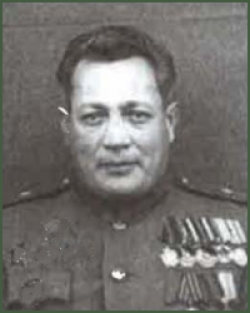Viktor Khusid was born in 1903 in the small village of Pribuzhany, 130 kilometers north of Odessa He studied in a traditional heder. Later his family moved to the nearby town of Voznesensk. Khusid's father became a cashier at a savings and loan association in this town, while Viktor studied at a public school (or, according to a different source, at a classical gymnasium). Viktor did not graduate because in 1918, at the age of 15, he joined Red partisans who were fighting against the Germans (the German Imperial Army had occupied Ukraine as one consequence of the Treaty of Brest-Litovsk). Thus, when Khusid entered an artillery school in Odessa in 1922, he already had four-years of military experience.
At the beginning of the Soviet-German war in June 1941, Khusid was the commander of the 552nd howitzer regiment with the rank of lieutenant-colonel. From 1942 to 1944 he served as commander of artillery of various units (army groups) of the Red Army, and in 1943, for a short time – as commander of the 10th Artillery Division of the Reserves of the Superior Command. In May 1944, he became commander of the 1st Guards Glukhovskaia Artillery Division. In November of that year, he was promoted to the rank of major-general. He took part in the Stalingrad Operation in 1942-1943 and then in the liberation of Ukraine, Poland, and Czechoslovakia. He ended the war in Germany, where he participated in the capture of Dresden and Berlin.
Khusid was awarded many military awards, including The Orders of the Red Star, of The Red Banner, of Lenin, of Suvorov, and two Orders of Kutuzov. He received his first order (that of The Red Star) in February 1942 for his actions on July 30-31, 1941, during the early, unsuccessful stage of the war, when the Higher Commando rarely gave out military awards. In July 1941, in the face of the general retreat of the Red Army, Lieutenant-Colonel Khusid succeeded in leading his artillery battalion of four hundred men with many weapons and much ammunition, out of from enemy encirclement in eastern Moldavia, without abandoning anything. In the process, his men captured 11 enemy soldiers and three mortars.
The essay "Colonel Viktor Khusid" by Shmuel Persov was published in the Yiddish newspaper Eynikayt in Moscow in 1944. On January 19, 1945, the renowned Hebrew poet Nathan Alterman published his poem "General Hasid" (the last name Khusid was transliterated as Hasid by the Hebrew periodicals of that time) in the newspaper Davar, that was published in Mandate Palestine.







